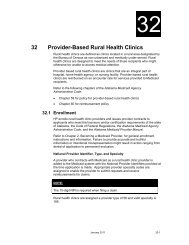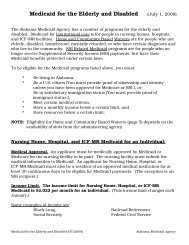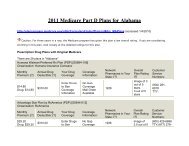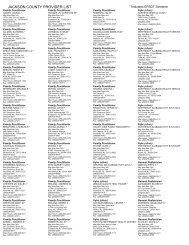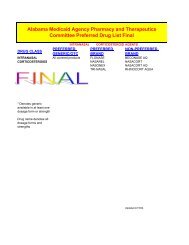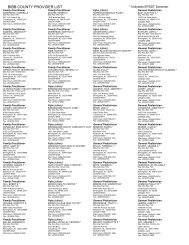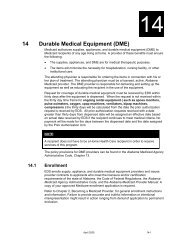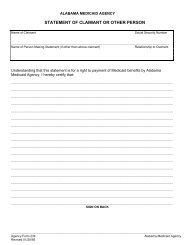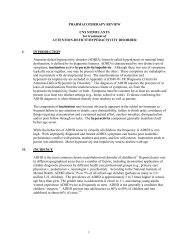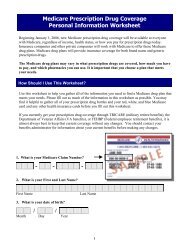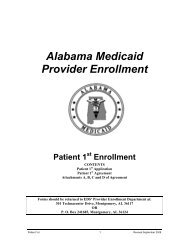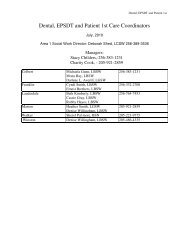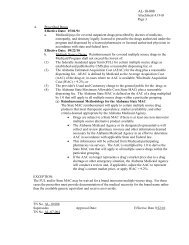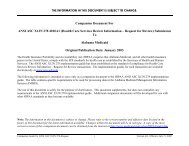Appendix A Well Child Check-Up (EPSDT)
Appendix A Well Child Check-Up (EPSDT)
Appendix A Well Child Check-Up (EPSDT)
Create successful ePaper yourself
Turn your PDF publications into a flip-book with our unique Google optimized e-Paper software.
<strong>Well</strong> <strong>Child</strong> <strong>Check</strong>-<strong>Up</strong><br />
Laboratory<br />
Test<br />
Public Health:<br />
Alabama Voice<br />
Response<br />
System<br />
(AVRS):<br />
Iron Deficiency<br />
Anemia<br />
Screening<br />
Urine screening<br />
Description<br />
The Alabama Voice Response System (AVRS) is a Newborn Screening<br />
Information System, offered by the Alabama Department of Public Health.<br />
The AVRS provides 24-hour, seven days a week telephone reporting of<br />
screening results in 30 seconds or less directly through a toll free number,<br />
(800) 566-1556.<br />
The AVRS was designed to allow physicians quick access to Newborn<br />
Screening results.<br />
The AVRS requires pre-registration with the screening program and positive<br />
identification of the caller through two security checks. Physicians are<br />
prompted by the system to enter their state license number (preceded by<br />
zeros, if needed, to make a seven digit number), in addition to the entry of a<br />
four-digit personal identification number or PIN.<br />
Physicians may register with the program by completing the Alabama Voice<br />
Response System Registration Form. This form may be requested by<br />
calling the Newborn Screening Program at 334-206-2971 or by accessing<br />
the Newborn Screening website at: www.adph.org/NEWBORNSCREENING/<br />
. Applicants will be notified when their form has been processed.<br />
Each physician chooses his individual PIN and records the number on the<br />
pre-registration form. The PIN must be four numeric characters.<br />
Physicians must have available the specimen kit number found on the filter<br />
paper collection form preceded by the year of the infant's birth or the<br />
mother’s social security number.<br />
Information is provided by recorded voice messages. The infant’s name and<br />
date of birth are spelled and verified by user response before any test results<br />
are given. Along with the test result, information is provided concerning the<br />
need for repeat testing or medical follow-up.<br />
Additional information may also be obtained by contacting the Newborn<br />
Screening Program at (334) 206-2971, (334) 206-5955 or (800) 654-1385.<br />
Hematocrit or hemoglobin values must be determined at a medical screening<br />
visit between 1-9 months of age. However, providers have the option of<br />
obtaining the lead and Hct or Hgb at nine or twelve months of age.<br />
Hematocrit or hemoglobin must be determined, between 11-20 years of age,<br />
and as deemed medically necessary based on physical examination and<br />
nutritional assessment.<br />
Urine screening must be performed at the medical screening visit at five<br />
years of age and at each visit between 11 and 20 years of age depending on<br />
the success in obtaining a voided urine specimen. If specimen is<br />
unobtainable, SNA (Specimen Not Available) should be documented. The<br />
required screening procedure is a dipstick that shows the measurement of<br />
protein and glucose. Urine obtained from recipients between 11 and 20<br />
years of age should be checked for leukocytes. ( Effective 10/01/2008 the<br />
urinalysis component of an <strong>EPSDT</strong> screening is no longer a requirement). A<br />
urinalysis should only be performed if clinically indicated.<br />
Chlamydia<br />
Screening<br />
Chlamydia Screening is recommended for all sexually-active females aged<br />



